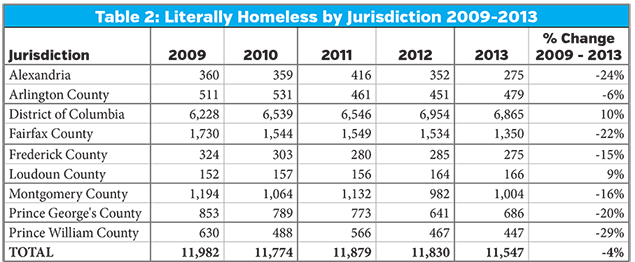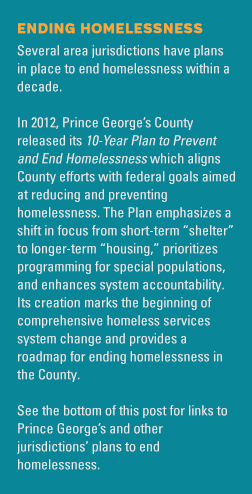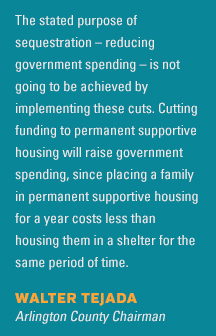A new report shows that although homelessness is continuing to decline in the region it remains a major problem and two key obstacles – sequestration and a lack of affordable housing – could impede local jurisdictions’ goals to end homelessness within a decade.
The report Homelessness in Metropolitan Washington which was released by the Council of Governments last week shows that there are 11547 homeless persons in the region representing a 2.4% decrease from 2012 and a 4% decrease from 2009.

According to the report one of the primary factors driving this reduction is the 83% increase since 2009 in the number of formerly homeless persons in metro Washington placed into permanent supportive housing.
Permanent supportive housing combines housing for chronically homeless persons with support services. Most chronically homeless residents suffer from severe physical health mental health and domestic violence related impediments. Health impediments may include substance abuse and physical disabilities. The problem is more acute when individuals suffer from multiple challenges. Support services for the chronically homeless such as job training education social skills training and child care help make them active members of society.
From 2009 to 2013 over 4300 persons in the region were moved into permanent supportive housing and are no longer considered homeless.
 Two other leading causes for the reduction in homeless persons include proactive shelter diversions and homeless prevention programs which get individuals and families the support they need to avoid entering the shelter system in the first place and federal Rapid Re-housing funds which focus on getting already homeless persons into housing quickly so that they are better able to receive and respond to any necessary interventions to improve and stabilize their lives.
Two other leading causes for the reduction in homeless persons include proactive shelter diversions and homeless prevention programs which get individuals and families the support they need to avoid entering the shelter system in the first place and federal Rapid Re-housing funds which focus on getting already homeless persons into housing quickly so that they are better able to receive and respond to any necessary interventions to improve and stabilize their lives.
Despite the fact that homelessness in metro Washington decreased slightly in both 2013 and 2012 after rising slightly in 2011 program funding cuts from sequestration and rising housing costs pose major difficulties for local governments and service providers to make dramatic reductions in the number of homeless persons in the region.
Sequestration mandates across-the-board funding cuts which is reducing access to and use of housing choice vouchers which are especially critical to providing permanent supportive housing in a high-price region like metro Washington.
Sequestration also threatens to reduce funding to grants (the Emergency Solutions Grants and the Continuum of Care grants) that fund the other two key programs supporting the region’s reduction in homelessness – the shelter diversion/prevention programs and Rapid Re-housing.
This year there may not be enough funds to renew all existing grants which would eliminate funding for some jurisdictions for shelter diversion and prevention and Rapid Re-housing. The reduction in vouchers is of particular concern given the region’s already insufficient supply of affordable housing.
At the recent Council of Governments’ Board of Directors meeting at which the report was released several Board members expressed concern about the negative impacts sequestration could have on the region’s goals to end homelessness.
Fairfax County Chairman Sharon Bulova pointed out that given the across-the-board nature of cuts from sequestration many struggling families are being hit hard in multiple ways. For example the same family that’s losing its housing voucher may at the same time see their child’s head-start program cut.
 And Arlington County Chairman Walter Tejada noted that the stated purpose of sequestration – reducing government spending – is not going to be achieved by implementing these cuts. Tejada pointed out that cutting funding to permanent supportive housing will raise government spending since placing a family in permanent supportive housing for a year costs less than housing them in a shelter for the same period of time.
And Arlington County Chairman Walter Tejada noted that the stated purpose of sequestration – reducing government spending – is not going to be achieved by implementing these cuts. Tejada pointed out that cutting funding to permanent supportive housing will raise government spending since placing a family in permanent supportive housing for a year costs less than housing them in a shelter for the same period of time.
A growing economy and a thriving inclusive housing market that provides choices at all income levels are two of Region Forward’s main goals. Ending homelessness is a key goal for the Council of Governments’ member jurisdictions. Metropolitan Washington is making progress on these goals but the across-the-board cuts presented by sequestration threatens to derail that progress.
Local Governments’ Plans to End Homelessness:
Alexandria: 10 Year Plan ot End Chronic Homelessness and Other Forms of Homelessness
Arlington County: A 10 Year Plan to End Homelessness in Arlington County VA
District of Columbia: Homeless No More: A Strategy for Ending Homelessness in Washington DC by 2014
Fairfax/Falls Church: Plan to Prevent and End Homelessness
Montgomery County: Beginning to End
Prince George’s County: 10 Year Plan to Prevent and End Homelessness
Frederick County: Plan currently under development
Loudoun County: Draft plan developed hoping to adopt within a year
Prince William County: Plan currently under development
Header photo credit: Bob Jagendorf